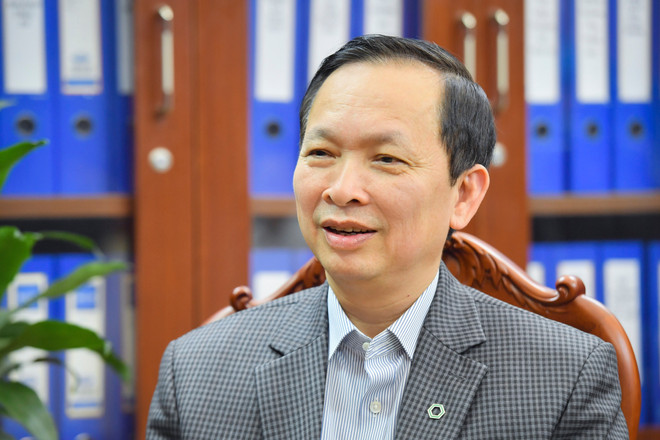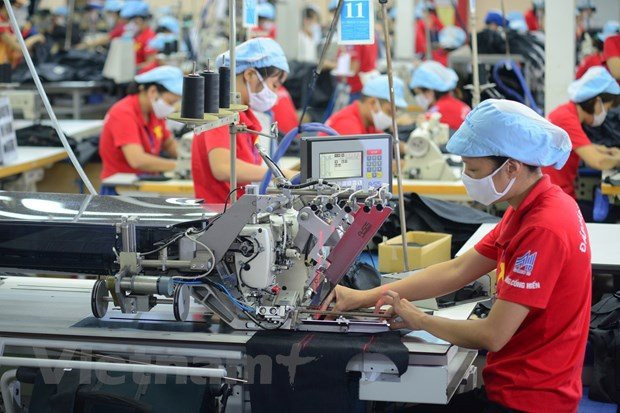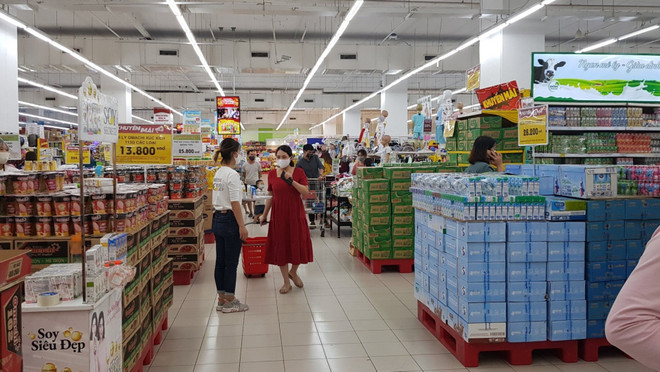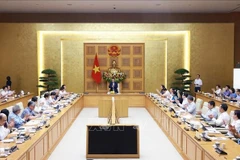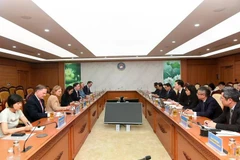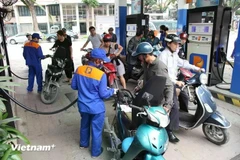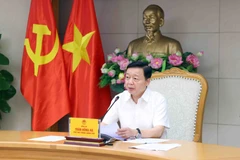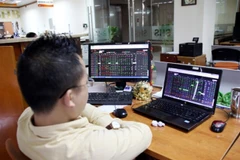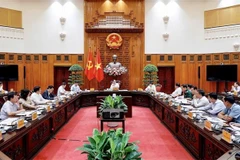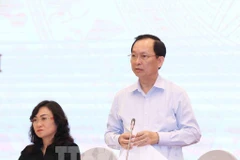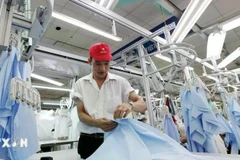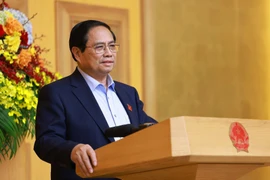Hanoi (VNA) - Deputy Governor of the State Bank of Vietnam (SBV) Dao Minh Tu has stated that the central bank will keep a close watch on market developments and make adjustments with high flexibility.
At a teleconference between the Government and localities in early January, Tu affirmed that despite unprecedented difficulties in 2022, the inflation was kept under control, macro-economy was stable while national credit rating was promoted. The achievement was partly attributed to a suitable adjustments of the monetary policy, he said.
The International Monetary Fund (IMF) has warned that one-third of global economies will be affected by a recession in 2023, and that the world would face a year full of challenges.
To cope with these headwinds, Tu said the bank will closely monitor the domestic and global economic situations to have a prudent, flexible and synchronous operating policy.
- What is your assessment of the financial and banking market developments in 2022, given that the past year was a turbulent of the domestic financial and monetary market? In your opinion, what is the biggest challenges facing the financial and banking market this year?
Dao Minh Tu: The year of 2022 is a crucial year for Vietnam, marking a positive recovery process and a safe, flexible, and effective adaptation of the economy post-pandemic, particularly in the context of rapid, complicated, and unpredictable changes in the region and the world.
However, the year has also seen unprecedented developments, surpassing the forecasting abilities of international organizations and countries. The strategic competition between major countries is intensifying, the Russia-Ukraine conflict is ongoing, and inflation rates are soaring worldwide. In addition, interest rates are increasing, and monetary policies are being tightened.
At home, fuel and commodity prices have been fluctuating, while inflationary pressures have been increasing, and unfavorable developments in the corporate bond market and real estate market have caused significant impacts on monetary and banking activities.
To adapt to the rapid fluctuations of the global and domestic situations, the SBV has proactively monitored developments and promptly adjusted policies, contributing to stabilizing the macro-economy, controlling inflation at a low level, supporting economic growth recovery, and ensuring the safe development of the credit institution system.
From the beginning of 2022, the SBV set the target of credit growth of around 14% for the whole year, which can be adjusted based on reality to support economic recovery and development.
By November 2022, the liquidity of credit institutions improved thanks to the easing of external influences. This led to the SBV’s decision to expand room by 1.5%-2% for the whole credit system. Credit institutions with better liquidity and lower interest rates will enjoy higher credit growth.
- In the light of the unpredictable developments in deposit interest rates in 2022, what operating schemes does the State Bank have in place to enable banks to mobilize capital and support enterprises at the same time?
Dao Minh Tu: The SBV kept its operating interest rates unchanged from the beginning of the year to mid-September 2022, despite a rapid increase of interest rates in the world and increasing domestic inflation pressure. This move aimed to create favorable conditions for credit institutions to access capital from the bank at a low cost.
However, since the end of September 2022, the monetary and banking sectors had been impacted negatively due to the high global inflation and the continuous adjustments of operating interest rates by the US Federal Reserve (Fed), which are expected to rise further in the near future.
In response to these challenges, the SBV has directed credit institutions to avoid competing to increase deposit interest rates while making efforts to reduce operating costs, administrative procedures, and unnecessary expenditures. This will create more room for reducing lending rates, supporting businesses and individuals to overcome difficulties.
This is a timely solution, in line with the general trend of increasing interest rates around the world, aimed to prioritize inflation control, keep exchange rates stable, create new credit rooms to help banks adapt to fluctuations in the market, contributing to macroeconomic stability.
In December 2022, the SBV and the Vietnam Banks Association requested credit institutions and commercial banks seriously respond to a call for consensus on deposit interest rates for all terms of not exceeding 5% per year (including promotions) and loan interest rates reduction by 0.5%-2%.
- In 2023, the global financial situation is expected to remain challenging. In your opinion, what is the biggest pressure faced by the banking industry this year?
Dao Minh Tu: It is evident that inflationary pressures are likely to go up this year, with inflation projected to exceed 5% by the end of 2022. This poses a challenge to the task of controlling inflation from the beginning of 2023.
Moreover, the reduction of lending interest rates under the direction of the National Assembly will face significant difficulties and challenges as major central banks around the world continue to tighten monetary policy by adjusting interest rates, leading to a rise in inflation rates.
The capital market, especially the corporate bond market, has been also facing difficulties, and the slow disbursement of public investment is another challenge.
Moody's has warned about macro uncertainties if Vietnam prolongs the risk of capital maturity/liquidity. The restructuring of the credit institution system in association with bad debt settlement continues to be challenging due to limited financial resources.
The restructuring of weak banks is a problem, which requires the application of strong and unprecedented solutions to solve.
Finally, bad debts continue to pose risks to the safety and operational efficiency of credit institutions due to the consequences of COVID-19 and the complicated developments of the domestic and international socio-economic situation, making it difficult for customers to repay debts.
- In the face of numerous challenges, what countermeasures has the State Bank taken as an agency responsible for administering monetary policy?"
Dao Minh Tu: In 2023, the SBV will closely monitor developments and economic situation both at home and abroad to have a prudent, flexible and synchronous operating policy, contributing to the target of controlling inflation at around 4.5%.
The SBV has implemented a number of measures to manage credit growth reasonably in line with macroeconomic development, contributing to curbing inflation, backing economic recovery and growth.
The bank has directed credit institutions to concentrate capital on production and business sectors, priority areas, and growth drivers in line with the Government’s guidelines.
The State Bank also considers giving priority to credit granting based on the green project classification list, and providing loans to individual housing needs, social housing projects, worker housing, and low-cost commercial housing projects.
The bank will continue to implement supporting policies under the socio-economic recovery and development program, especially the 2% interest rate support policy under Resolution 43 of the National Assembly and Decree 31 of the Government.
The bank will also implement a project on restructuring the system of credit institutions associated with bad debt settlement in the 2021-2025 period, which aims to step up the handling of bad debts and weak credit institutions.
The bank will also strengthen inspection work and improve the effectiveness of macro and micro safety supervision.
The year of 2023 is forecast to see various difficulties and challenges, therefore, the SBV will continue a very flexible policy related to interest rates and exchange rates, aimed at ensuring balances as well as the trust from business community and the people as well, according to the deputy Governor./.
